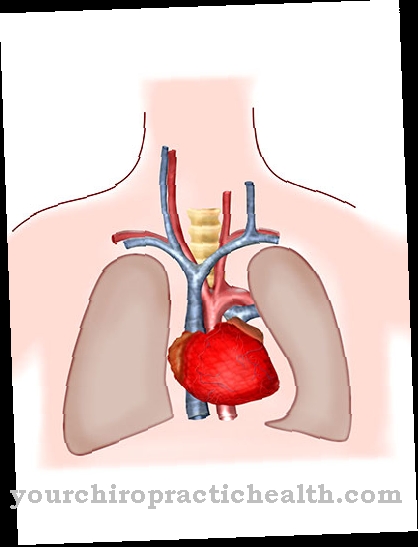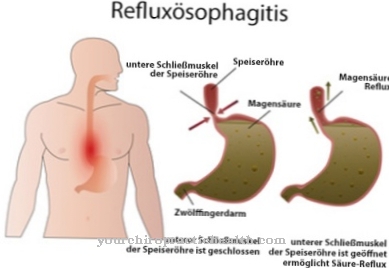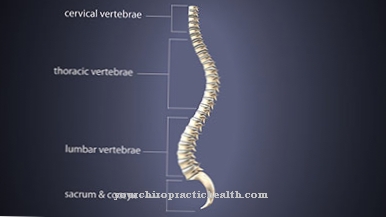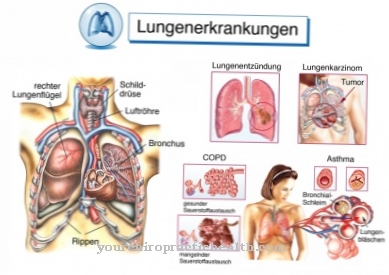Polyneuritis is an inflammatory disease of the peripheral nervous system or cranial nerves. Several or all nerves can be affected to varying degrees. Parasitic sensations and functional disturbances in damaged areas of the body are typical symptoms. The causes and associated therapeutic approaches are subject to a wide variety.
What is polyneuritis?

© Monstar Studio - stock.adobe.com
The Polyneuritis describes an inflammatory process of nerves and is a generic term for several clinical pictures. Damage to nerve cords and nerve endings without inflammatory processes outside the brainstem and spinal cord are included in polyneuropathy. The peripheral nerve pathways run from the central nervous system into the whole body.
Motor commands are given to the limbs and muscles via these lines. Passively received stimuli from sensory nerves transmit sensations to the brain, where these are then evaluated and interpreted. The autonomic nervous system, on the other hand, automatically controls the activity of organs such as the heartbeat and cannot be consciously controlled by humans.
In mononeuritis, the inflammation of a single nerve is in the foreground. If the damage occurs to several nerves that are not directly connected to one another, the term mononeuritis multiplex is used. Cranial polyneuritis is a disease of the nerves directly in the brain stem. A well-known representative of acute polyneuritis is the life-threatening Guillain-Barré syndrome and herpes zoster.
causes
Bacterial and viral infections can cause polyneuritis. Borreliosis, diphtheria and HIV disease are included. Autoimmune diseases also lay the foundation for an inflammatory attack on the nervous tissue. Own defense cells attack the nerve cells and are therefore responsible for a wide range of symptoms.
Guillain-Barré syndrome has such characteristics. Stress on the organism due to an unhealthy diet from foods contaminated with heavy metals or environmental toxins also leads to stress on the nervous system. Lead and mercury are known for their nerve damaging properties. The same goes for the regular use of drugs such as antibiotics.
Extreme therapy measures against cancer through chemotherapy also act as a possible trigger for polyneuritis. Malignant tumors eat away at the surrounding tissue and can cause serious damage directly to the nerve tract. If abnormal sensations and pain suddenly occur without a slow increase in signs, this is usually due to an acute event.
If the effects of polyneuritis progress slowly but steadily, one or more underlying diseases are usually hidden behind it. For example, heavy alcohol abuse impairs the detoxification function of the liver and kidneys. Insufficient intake of nerve vitamins such as vitamin B1, B6 or B12 also increases the risk of illness immensely.
An overdose of vitamin B6 is rarely responsible for health problems. In addition to an underactive thyroid, circulatory disorders can also be used to narrow down the causes. In about a quarter of cases, a hereditary component is considered to be the main factor.
Symptoms, ailments & signs
In the case of polyneuritis, the quality of the transmission of stimuli is reduced. The nature of the signs in a disease are motor or sensory in nature. Autonomous malfunctions are also part of the clinical picture. As a rule, the development begins with discomfort in the extremities. At first feet and legs show typical characteristics of an over-sensitization, later hands and arms are added.
Without external influence, those affected experience abnormal sensations, which are accompanied by severe pain and numbness. Inflammation of sensory nerves often creates a tingling sensation on the skin. Polyneuritis is also characterized by opposite reactions. Nerves no longer respond adequately to excessive heat, pressure, or extreme cold.
The sensation of pain and the sense of touch get out of balance and no longer react adequately to external influences. This creates the risk of unintentional injury from burns or frostbite. Expressions of the disease are often present on both sides of the body, although asymmetrical courses also exist.
Damage to the motor nerves leads to a weakening and decline of the muscles. The involvement of the autonomic nervous system provokes cardiac arrhythmias, fluctuations in blood pressure and problems of the digestive tract, among other things.
Diagnosis & course of disease
Examination of the blood and urine can provide possible evidence of polyneuritis and help make a diagnosis. In addition, the description of the patient to the specialist confirms the suspicion of an inflammatory disease of the peripheral nervous system.
Confirmation or exclusion of polyneuritis is obtained through a comprehensive examination of the body and nerve conduction velocity from a neurologist. This tests general body functions such as muscle strength, reflexes and nerve conduction speeds.The attending physician differentiates between superficial damage to the nerve sheath and direct damage to the nerve cord.
The knowledge gained in this way allows initial conclusions to be drawn about the cause. An exact pathogenesis supports the further search and focuses on the exact course and history of the disease. Any underlying illnesses, unexplained symptoms and the use of medication are taken into account here. A family history of neurological diseases can indicate a genetic disposition.
As a last resort, the doctor orders a biopsy of the nerve tissue and an examination of the nerve water. The disease can suddenly appear very intensely without any sign or slowly and weakly spread over the entire body over years and manifest itself chronically.
Complications
Polyneuritis generally leads to various abnormal sensations and disorders of sensitivity. However, it cannot be predicted which regions of the body will be affected by these abnormal sensations. As a result of this disease, patients suffer from restricted mobility and in some cases also from deafness. The typical tingling sensation occurs on the skin.
Likewise, the patients can no longer properly perceive various feelings and stimuli on the skin and are therefore very limited in their everyday life. The quality of life of the patient is also significantly reduced and negatively influenced by the polyneuritis. Injuries can also occur if those affected cannot perceive stimuli properly. The disease also leads to disturbances of the heart rhythm and in the worst case can lead to death of the person concerned.
Digestion problems can also arise. As a rule, the treatment of polyneuritis depends on the underlying disease, so that the complications and the further course of this disease depend heavily on this disease. However, many patients are also dependent on psychological treatment, as it is not uncommon for depression and other psychological disorders to occur.
When should you go to the doctor?
In the case of polyneuritis, medical treatment is always necessary. This disease does not self-heal and if left untreated it can lead to death in the worst case. For this reason, polyneuritis must always be treated early to prevent further complications. A doctor should be consulted if there are symptoms of sensitivity to the limbs. The symptoms primarily affect the feet and hands. They can feel numb and tingle, and these limbs can no longer move easily. Furthermore, external stimuli can no longer be correctly assessed, so that pressure or heat can no longer be correctly assigned. If these symptoms occur suddenly, a doctor must be consulted.
As a rule, polyneuritis can be diagnosed by a general practitioner. The treatment of the disease is always based on the exact cause, so that no general predictions can be made about the further course. The disease may also reduce the patient's life expectancy.
Treatment & Therapy
If the outbreak is based on a recognizable underlying disease, targeted therapy can be used against this. In this case, there is a prospect of clear regression of the patient's symptoms. Depending on the severity, cause and duration of the illness, a complete recovery is even possible. If the direct reason remains undetected, treatment is primarily oriented towards alleviating the symptoms.
High-dose vitamin preparations (B1, B12) are used to combat deficiencies. If necessary, diabetics receive alpha lipoic acid. If an autoimmune reaction is a possible trigger, the treatment focuses on suppressing the body's defenses. Severe cases favor the development of depression due to the persistent physical and psychological stress on the sick person.
The administration of antidepressants and local pain relievers, sometimes also anticonvulsant drugs, is then appropriate. Infectious diseases such as borreliosis must first be thoroughly diagnosed in order to obtain appropriate medication against the pathogen. Physiotherapy helps to regenerate muscles that have receded and relieves joint problems.
Restrictions in their mobility and function are thus partially reversed. Due to the diverse causes and underlying diseases of polyneuritis, a specialist must make an accurate diagnosis for a suitable therapy.
You can find your medication here
➔ Medicines for paresthesia and circulatory disordersprevention
Suitable prevention consists of avoiding potential risk factors. These include the timely diagnosis and therapy of underlying diseases that cause polyneuritis. The first warning signs give the family doctor an indication of a possible disease of the peripheral nervous system. An early medical intervention increases the chances of a positive outcome, an effective slowing down of the spread and the preservation of the quality of life of sick people.
Aftercare
The term 'polyneuritis' includes inflammatory processes in the nerve tracts. Shingles or the Epstein-Barr virus are polyneuritides. The tissue of the nerves is affected. Follow-up care is advisable to avoid secondary damage or to keep it as low as possible.
The form of aftercare depends on the causal disease. The goal in all cases is a complete elimination of the symptoms, and the inflammation should heal in the medium to long term. The doctor must first determine the underlying disease. He gives the patient medicine that reduces the inflammatory process.
If necessary, pain medication is prescribed. Follow-up care lasts until the time of healing; the healing progress is checked during visits to the doctor. Side effects must be recognized early and prevented. In the event of intolerance, the patient receives alternative medication that is more precisely adapted to his condition.
Untreated nerve inflammation can become life-threatening. For this reason, the person affected must also make use of the follow-up care and regularly come to the follow-up checks. In the event of a sudden worsening or recurrence of the symptoms, he must seek medical treatment immediately. He will be given medication again; a hospital stay may be necessary at the doctor's discretion.
You can do that yourself
Since polyneuritis is mainly caused by viruses, the patient should primarily strengthen their immune system. Because a powerful immune system is a safe weapon against all kinds of intruders, including viruses.
There are several approaches to strengthen the immune system. Holistic doctors and alternative practitioners swear by detoxification measures with homeopathic remedies and colon cleansing (colon hydrotherapy). Since it has recently become known that 80 percent of all immune cells are located in the intestine, the administration of probiotics is also indicated. This is understood to be a preparation that contains living microorganisms that multiply in the intestine and are supposed to help maintain the immune system there. This preparation can be a yogurt as well as a dietary supplement or medicine. The word “probiotics” is made up of the Greek word “bios” (life) and the Latin word pro (for). The name emphasizes the health-promoting influence that microorganisms have.
If there is also a vitamin B deficiency behind the disease, a dietary supplement with B vitamins is recommended. There are also other dietary supplements that can support the immune system. The doctor or pharmacist will advise you here. Stabilizing the immune system also requires an appropriate lifestyle: a good, healthy, varied diet, lots of sleep and rest, but also lots of exercise. The daily walk in the fresh air activates the immune cells - regardless of the weather.
























.jpg)



